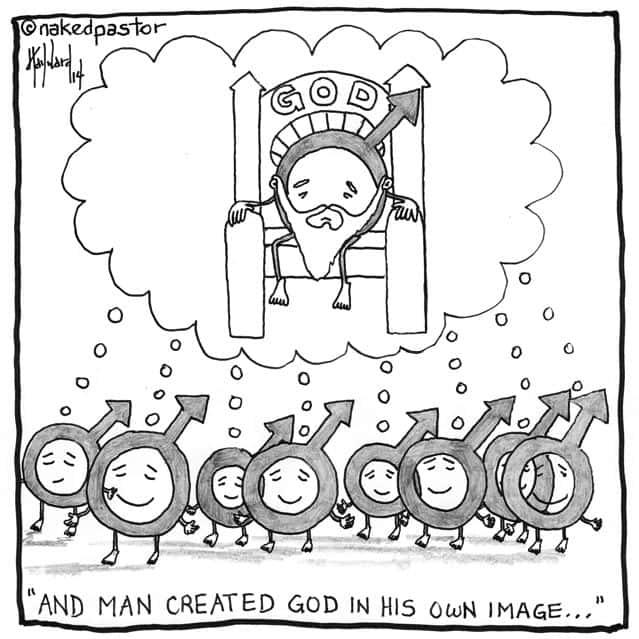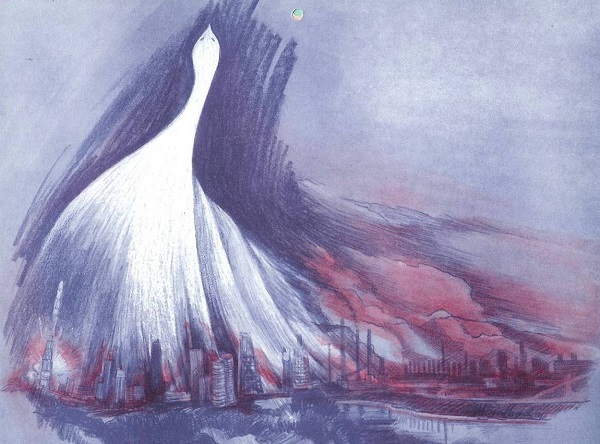"There can be no renewal of our relationship with nature without a renewal of humanity itself." Pope Francis, Laudato Si', 118.
Fleshly desire (concupiscentia carnalis), often satiated by resorting to violence, has driven human behavior since the inception of patriarchal human history, 10,000 years or so ago. Homo sapiens is in the process of becoming, but we are not there yet. We are, at best, Homo economicus, mostly driven by the maximum power principle. The patriarchal mindset of domination by brute force, exacerbated since the 1800s by the power of fossil fuels, has led to ecological overshoot, whereby population and resource consumption growth exceed the regenerative capacity of the Earth's biosphere. The great challenge of humanity in the 21st century is to establish a healthy ecological balance between humans and the planet.
This is not about basic human needs. This is about unnecessary excesses, luxuries, and an insatiable desire for gratification of the senses. When it comes to accumulation of material artifacts and getting away with "eating the cake and keeping it too," we know where we are coming from. Except for stubborn denialists, we all know where we are. The future is unknown, but it seems reasonable to anticipate that we must change course if the human species is to survive. Since human behavior is the problem, it follows that humans, and only humans, are responsible for the solution. Planet Earth is not the problem. Mother Nature is not the problem. God is not the problem. Scapegoating is no longer possible, because there is no planet B and there are no sacrificial aliens coming from other planets; so humans must face the reality of ecological overshoot and do something about it.
This article summarizes where we are coming from (Part 1) and where we are (Part 2), and then suggests a hypothesis as to where we might want to go (Part 3).
Part 1 ~ The Patriarchal Age and the Judeo-Christian Tradition
The patriarchal age commenced with the agricultural revolution (circa 10,000 BCE). It has been a global experience in all cultures. It was already taken for granted as the natural order of things when the oldest biblical texts were written. The conflation of patriarchy and religions unfolded in various ways all over the world, with male hegemony over females being an overarching constant. The following is a summary of the evolutionary process in the Judeo-Christian Tradition:
- In Genesis, patriarchy is the divine punishment for original sin.
- In the Old Testament, wives are the property of their husbands.
- For Aristotle, the male is by nature superior and the female inferior.
- Before his resurrection, Jesus chose 12 men to send them as apostles.
- After his resurrection, Jesus sends Mary Magdalene and other women.
- In apostolic times, women are baptized but not chosen to head churches.
- During the first millennium, the church coalesces as patriarchates.
- The patriarchal mindset (secular and religious) drives the crusades.
- For Augustine, women are fully human but inferior to men.
- For Aquinas, women can be baptized but cannot be ordained.
- The patriarchal mindset (secular and religious) drives the inquisition.
- After Aquinas, patriarchal theology becomes enshrined as natural law.
- During the second millennium, the church becomes a global patriarchy.
- The patriarchal mindset drives the colonization of entire continents.
- The industrial revolution enhances the power of patriarchal elites.
- Early 20th century, sign of the times, first wave feminism.
- World War I, World War II, and the specter of nuclear warfare.
- Late 20th century, sign of the times, second wave feminism.
- Early 20th century, ordination of women in the Protestant Churches.
- Late 20th century, ordination of women in the Anglican Communion.
- In the Catholic Church, ordination is still reserved to men alone.
- Early 21th century, sign of the times, third wave feminism.
The following cartoon is a good synopsis of patriarchal theology:

God in Man's Image
Courtesy of David Hayward ~ Click the image to enlarge
For a critical historical analysis of the evolving conflation of primitive taboos, Aristotelian biology (via Aquinas), and Judeo-Christian doctrines of human sexuality, consider Eunuchs for the Kingdom of Heaven: Women, Sexuality, and the Catholic Church. This is not just of academic interest for historians, because it has had, and continues to have, a significant impact on issues of social and ecological justice.
Part 2 ~ The Apogee of Human Power and Ecological Overshoot
Technological advances, enabled by the power of fossil fuels, are now leading us to the apogee of human power. The term Anthropocene has been coined to designate this time when humans have become a decisive influence on the human habitat, including the planetary climate. It is unfolding as a great acceleration whereby economic growth drives population growth, which in turn drives more economic growth as long as natural resources are available and humans can "manage" the ever increasing degrees of complexity in social systems. Corporations love it, because they always need more customers to be seduced by marketing campaigns and more cheap labor to produce all the "necessary" widgets to keep people distracted from economic inequities and self-destruction via side effects such as air and water pollution, industrial toxicity, deforestation, soil degradation, species extinction, ocean acidification, anthropogenic climate change, droughts, local/regional wars competing for resources (especially fossil fuels to energize even more growth), and so on.
Homo sapiens thus regresses to Homo economicus, a condition that often makes it hard to distinguish human beings from other animals. We cease to be embodied personal subjects, and become fleshly robots that satisfy fleshly desires (concupiscentia carnalis) with minimal attention to our integral (objective and subjective) development as human persons. The net result of this regression is ecological overshoot, whereby population and resource consumption growth exceed the regenerative capacity of the Earth's biosphere. What are the consequences? Just in terms of sampling human suffering, the patriarchal civilization of power at the service of convenience is looking ugly, very ugly:
It is not only about destroying the planet. We are self-destroying ourselves:

The elephant in the room is patriarchal human civilization.
Image courtesy of Peter Donovan at Soil Carbon Coalition.
This cartoon is a good summary of the symptoms of ecological overshoot. The elephant in the room is overpopulated patriarchal civilization. Think about it. The bed is the consolation of the poor. Who can blame them? Anyway, it is too late for the blame game. Rich and poor, young and old, healthy and sick, there are currently 7.9 billion people alive on the planet, and we are all facing the same predicament. Energy will become limiting no matter what we do: building, conserving, competing, cooperating, whatever. We certainly need to transition from maximizing power usage to optimizing power usage, as outlined in this excellent book: Power: Limits and Prospects for Human Survival. However, "there can be no renewal of our relationship with nature without a renewal of humanity itself" (Pope Francis, Laudato Si', 118).
Part 3 ~ The Language of the Body and Peace on Earth
It is not expected that "the lust of the flesh, the lust of the eyes, and the pride of life" (concupiscentia carnalis) will
be transcended anytime soon. Likewise, basic human needs are not expected to change much in the foreseeable future. However, due to the second law of thermodynamics and other physical laws, it is reasonable to anticipate that the amount of power humans can use to meet those needs will decrease significantly, whether voluntarily or involuntarily, before the end of this century.
How are we to minimize human suffering, and maximize human wellbeing, during this transition?
A hypothesis suggested in a previous article is that Homo economicus must become Homo ecologicus. In brief, Homo economicus makes decisions on the basis of economic self-interest alone, whereas Homo ecologicus makes decisions taking into account both economic self-interest and the ecological common good. Needless to say, the social common good and the ecological common good are inseparable. But how can we evolve the culture of human civilization so that it becomes "normal" to consider the common good when making personal decisions?
Many policy options have been proposed. Some, like adjudicating "carbon credits", are but ways of evading the real issues, i.e., "smoke and mirrors." Others are more reasonable, socially and scientifically:
The religious dimension is crucial. Religions have been instruments of war in the past, and now must become instruments of peace. For patriarchal religious traditions, gender peace is fundamental. How can religions be instruments of peace as long as they perpetuate gender stereotypes that preclude peace among all gender identities? Consider, for example, article 1024 of the Code of Canon Law in the Roman Catholic Church:
"A baptized male alone receives sacred ordination validly."
This is patriarchal gender ideology, rooted in original sin (cf. Genesis 3:16). This is a sexist law, plain and simple. It forces the language of the body in Catholic clergy to be exclusively masculine, and therefore sexist. It prescribes the language of the body in Catholic liturgies to be predominantly masculine (especially at the altar), and therefore sexist. Images of the Blessed Virgin Mary adorning the walls do not neutralize this sexist body language. On the contrary, Marianism exacerbates sexism by elevating one extraordinary woman to a pedestal and excluding all ordinary women from ordained ministry in the sacramental economy. Is this the way the Catholic Church proposes to foster a culture of world peace? Is this the way the Catholic Church proposes to foster integral human development? Is this how the Catholic Church proposes to foster an integral ecology?
There can be no peace of Earth, and no integral human development, and no integral ecology, as long as human civilization is predominantly patriarchal:

Civilization Transforming Into Peace ~ Mary Southard CSJ
Courtesy of Ministry of the Arts ~
Click the image to enlarge
It is ludicrous to assume that Jesus revealed religious patriarchy as a divine law when he chose 12 males to be apostles. As pointed out in Part 1, the signs of the times are clear. It is time for the Catholic Church to ordain women to the diaconate, the priesthood, and the episcopate. Nothing essential would change in terms of the Catholic faith. The following points for meditation are based on study of the Theology of the Body and the Catechism of the Catholic Church:
1. Jesus Christ is the Redeemer, God made flesh, not a patriarch.
2. God the Father is a person, but not a male.
3. God the Son is a person, but was not a male before the incarnation.
4. God the Holy Spirit is a person, but not a male.
5. The Trinity is a communion of persons, not a patriarchate.
6. The "Son of Man" is God made flesh, not a patriarch.
7. All men and women are fully consubstantial in one and the same human nature.
8. Bodiliness and sexuality are not simply identical.
9. Being a body-soul is more fundamental for human nature than sexuality.
10. The body is a sacrament of the entire person, but is not the entire person.
11. The priest acts in the person of Christ, not in the masculinity of Christ.
12. All men and women are ontologically homogeneous in their whole being.
13. All men and women are of the same flesh in their somatic structure.
14. The complementarity of man and woman is enabled by their consubstantiality.
15. All men and women are fully consubstantial with Jesus Christ as to his humanity.
16. For the redemption, the masculinity of Jesus is as incidental as the color of his eyes.
17. Jesus Christ is the Bread of Life, not the male of life.
18. The substance of the Eucharist is BODY, not XX or XY chromosomes.
19. The substance of the Eucharist is FLESH, not testosterone.
20. The Church is "one, holy, catholic, and apostolic," but not necessarily patriarchal.
21. Patriarchy is a disordered attachment to the supremacy of masculinity.
22. The Church is a communion of persons, not a patriarchate.
23. The Church is the body of Christ, not a woman with a male head.
24. The Virgin Mary is the "type" of the Church, not a woman with a male head.
25. The Virgin Mary precedes the sacramental economy as Mother of the Eucharist.
26. The Marian dimension of the Church precedes the apostolic dimension.
27. Apostolic succession is contingent on redeemed flesh, not on masculinity.
28. The nuptial mystery of Christ and the Church is not a patriarchal marriage.
29. Canon 1024 is an artificial contraceptive and abortifacient of female priestly vocations.
30. Catechism 1577 reduces the priesthood of the New Law to priesthood of the Old Law.
31. Catechism 1598 declares that ordaining only males is a choice, not a dogma.
32. The exclusively male priesthood makes invisible the "feminine genius" in Christ.
33. The Christian/Catholic/Orthodox faith is not intrinsically (dogmatically) patriarchal.
34. The conflation of patriarchal gender ideology and Christian doctrines is a disgrace.
35. Institutionalized ecclesiastical patriarchy is an abuse against Christ and the Church.
36. It is time to discard the patriarchal scaffolding that obscures the Catholic faith.
37. Male headship is an ancient but entirely artificial cultural custom, not natural law.
38. After the resurrection, nothing requires that apostolic succession be exclusively male.
39. The first "transubstantiation" in history happened in the Blessed Virgin Mary's body.
40. Transubstantiation can happen via women ordained to act in persona Christi.
"What is not assumed is not redeemed." Humanity is male and female, not male or female. For the redemption, and the sacramental economy, what really matters is the body-soul humanity of Jesus, not simply his masculinity; for the New Law, what matters is that the Word became flesh, not that Jesus is male. The Church should stop defending culturally biased doctrines and allow Christ to call women to the priesthood and the episcopate. It is hard to imagine that ecclesiastical patriarchy is what the Risen Christ wants for the church in the 21st century.
The great challenge of humanity in the 21st century is the renewal of healthy mutuality between humans and the human habitat.
Part 1 of this essay argued that patriarchy, including religious patriarchy, has been a decisive cultural factor leading to the current social and ecological dysfunction of human civilization. Part 2 explained how the power of fossil fuels has enhanced human power to the point of causing ecological overshoot. Part 3 is an appeal to overcome religious patriarchy as the most pernicious obstacle to human development and ecological sanity. The Catholic Church (1.2 billion people) does much good because it is Christian, not because it is patriarchal. It could make a very significant difference in the process of Homo economicus becoming Homo ecologicus; but not much as long as the church remains a patriarchal institution, because nothing good has ever come from domination by brute force, and nothing ever will.
If the church was patriarchalized during the first millennium,
then it can be depatriarchalized during the third millennium.
In the meantime, the encyclicals Laudato Si' and Fratelli Tutti are good guidance for men and women of good will. The
Laudato Si' Action Platform and the Laudato Si' Movement are recommended as a most effective way, especially for Catholics, to engage in the existential struggle for the renewal of humanity and human civilization:

Study the encyclicals Laudato Si' and Fratelli Tutti.
Click the image for more information about the Laudato Si' Platform.
Consider becoming active in the Laudato Si' Movement.